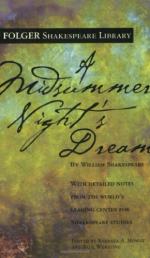|
|
A Midsummer Night's Dream Act 5, Scene 1: "Athens, The great hall in the palace of Theseus"
Theseus and Hippolyta enter the great hall in his Athenian palace. They cannot believe the stories they have heard from Hermia, Helena, Demetrius, and Lysander. "I never may believe / These antique fables, nor these fairy toys" Act 5, Scene 1, lines 2-3. Hippolyta is more inclined to believe them than Theseus, for the four distinct stories all correlate well and seem to be true.
The four lovers come into the hall with the royals as Theseus asks Philostrate what play they will be seeing on this joyous day of weddings. He gives a humorous list of four plays, all which do not please Theseus until Pyramus and Thisbe. Philostrate warns Theseus of the meagerness and novelty of this tragedy turned into a comedy by the players' mirth. Theseus commands to see the play anyway, and the players enter the palace ready to perform.
Topic Tracking: Love's Foolishness 14
Quince begins the prologue, chock full of incorrect grammar, mispronunciations, and complete farce. This scene consists of a play within a play and is set onstage with the palace set and the mobile set of the players. Theseus, Lysander, and Hippolyta comment on the childish players by saying, "His speech was like a tangled chain;/ Nothing impaired, but all disordered" Act 5, Scene 1, lines 123-124. Quince continues with the prologue, summarizes the story, and points out the actors who will play Pyramus and Thisbe and the wall that separates them. Bottom and Flute enact the play as Snout speaks as the wall separating them, Snug roars as the lion, and Starveling plays the Moonshine of the night. During the entire hysterical performance, the royals comment on the wit and mediocrity of the players and play. Bottom over-acts in a prima-dona over-dramatic death scene. As he dies a slow stage death, Hippolyta states, "Beshrew my heart, but I pity the man" Act 5, Scene 1, line 295.
As the "actors" lay dead on the floor, Theseus begins to speak. Bottom interrupts them saying that there is an epilogue to their play. Theseus stops them from continuing their spectacle. The players dance and sing a short song for the audience. Everyone leaves the palace.
Puck addresses the audience, inferring that the play is at its end. "I am sent with broom before, / To sweep the dust behind the door" Act 5, Scene 1, lines 396-397. Oberon and Titania join Puck with the fairies behind them. He blesses the newlyweds and tells the fairies to go through Athens and bless all the couples in love. They all sing and Puck concludes the play with the following soliloquy:
"If we shadows have offended,
Think but this, and all is mended,
That you have but slumbered here
While these visions did appear.
And this weak and idle theme,
No more yielding but a dream,
Gentles, do not reprehend,
If you pardon, we will mend.
And, as I am an honest Puck,
If we have unearned luck
Now to 'scape the serpent's tongue,
We will make amends ere long,
Else the Puck a liar call.
So, goodnight unto you all.
Give me your hands, if we be friends,
And Robin shall restore amends." Act 5, Scene 1, lines 430-445.



